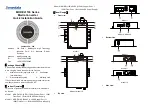
PAGE 44 — DCA220SSJU4F 60 HZ GENERATOR • OPERATION MANUAL — REV. #3 (02/10/17)
MAINTENANCE
FUEL TANK INSPECTION
In addition to cleaning the fuel tank, the following
components should be inspected for wear:
Rubber Suspension — Look for signs of wear or
deformity due to contact with oil. Replace the rubber
suspension if necessary.
Fuel Hoses — Inspect nylon and rubber hoses for signs
of wear, deterioration and hardening.
Fuel Tank Lining — Inspect the fuel tank lining for signs
of excessive amounts of oil or other foreign matter.
Replacing Fuel Filter
Replace the fuel filter cartridge with new one every 500
hours or so.
Loosen the drain plug at the lower top of the fuel filter.
Drain the fuel in the fuel body together with the mixed
water.
DO NOT spill the fuel during disassembly.
Vent any air
AIR REMOVAL
If air enters the fuel injection system of a diesel engine,
starting becomes impossible. After running out of fuel,
or after disassembling the fuel system, bleed the system
according to the following procedure. See the
John Deere
Engine Manual for details.
To restart after running out of fuel, turn the itch to the “
ON”
position for 15-30 seconds. Try again, if needed. This unit
is equipped with an automatic air bleeding system.
CHECK OIL LEVEL
Check the crankcase oil level prior to each use, or when the
fuel tank is filled. Insufficient oil may cause severe damage
to the engine. Make sure the generator is level. The oil
level must be between the two notches on the dipstick as
shown in Figure 31.
Replacing Oil Filter
Remove the old oil filter.
Apply a film of oil to the gasket/rubber seal (Figure 58)
on the new oil filter
Figure 58. Oil Filter
Install the new oil filter.
After the oil cartridge has been replaced, the engine oil
will drop slightly. Run the engine for a while and check for
leaks before adding more oil if needed. Clean excessive
oil from engine.
FLUSHING OUT RADIATOR AND REPLACING
COOLANT
Open both cocks located at the crankcase side and at
the lower part of the radiator and drain coolant. Open
the radiator cap while draining. Remove the overflow
tank and drain.
Check hoses for softening and kinks. Check clamps for
signs of leakage.
Tighten both cocks and replace the overflow tank.
Replace with coolant as recommended by the engine
manufacturer.
Close radiator cap tightly.
Flush the radiator by running clean tap water through
radiator until signs of rust and dirt are removed.
DO
NOT clean radiator core with any objects, such as a
screwdriver.
SEAL
OIL
FILTER
















































